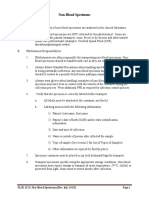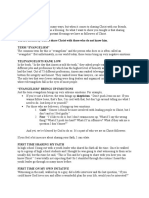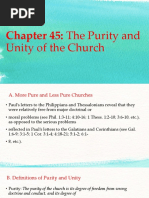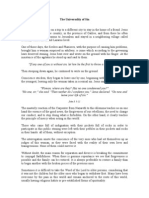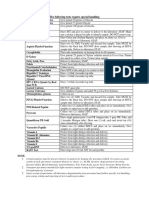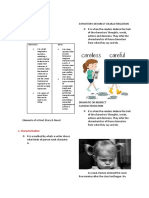0 ratings0% found this document useful (0 votes)
504 viewsLesson 3
Christian ethics teaches believers how to live in a way that glorifies God and brings blessings. It is based primarily on the teachings of the Bible, considering actions, attitudes, motives and consequences. When making decisions, Christians can weigh multiple factors like facts, advice, and guidance from the Holy Spirit. Understanding how God's requirements have progressed from the Old to New Testament covenants is important for properly interpreting and applying biblical principles.
Uploaded by
Ellise DulayCopyright
© © All Rights Reserved
Available Formats
Download as DOCX, PDF, TXT or read online on Scribd
0 ratings0% found this document useful (0 votes)
504 viewsLesson 3
Christian ethics teaches believers how to live in a way that glorifies God and brings blessings. It is based primarily on the teachings of the Bible, considering actions, attitudes, motives and consequences. When making decisions, Christians can weigh multiple factors like facts, advice, and guidance from the Holy Spirit. Understanding how God's requirements have progressed from the Old to New Testament covenants is important for properly interpreting and applying biblical principles.
Uploaded by
Ellise DulayCopyright
© © All Rights Reserved
Available Formats
Download as DOCX, PDF, TXT or read online on Scribd
You are on page 1/ 2
Lesson 3 guidance.
While these other factors can
Things You Should Know about Christian never override the teaching of Scripture,
Ethics: they can still be helpful for us in making
a wise decision.
1. Christian ethics teaches us how to live.
4. Christian ethics teaches us how to live for the
Christian ethics asks what the whole glory of God.
Bible teaches us about which acts, attitudes, and
personal character traits receive God’s approval The goal of ethics is to lead a life that
and which ones do not. glorifies God (“do all to the glory of God,” 1
Cor. 10:31). Such a life will have
This means that Christian ethics teaches us (1) a character that glorifies God (a Christ-
how to live. It is important to study Christian like character),
ethics so that we can better know God’s will, (2) results that glorify God (a life that
and so that each day we can “walk in a manner bears abundant fruit for God’s kingdom), and
worthy of the Lord, fully pleasing to him” (Col. (3) behavior that glorifies God (a life of
1:10). obedience to God, lived in personal relationship
with God).
2. The ultimate basis for Christian ethics is the
moral character of God. 5. Obeying God brings numerous blessings to
our daily lives.
God delights in his own moral character,
which is supremely good, unchanging, and The New Testament teaches at least seven
eternal. specific kinds of blessings that come to us in
His moral standards for human beings connection with living in obedience to God’s
flow from his moral character, and therefore commands in Scripture.
they apply to all people in all cultures for all of These blessings include:
history (although the Bible also contains many The joy of deeper fellowship with God
temporary commands intended only for specific (John 15:10);
people at a specific time). The joy of pleasing God (2 Corinthians
God is love, so he commands us to love (1 5:9; Colossians 1:10);
John 4:19). The joy of becoming a vessel for
He is holy, and he commands us to be holy “honorable use” by God (2 Timothy 2:20-
(1 Peter 1:15). 21);
He is merciful, and he commands us to be The joy of being an effective witness to
merciful (Luke 6:36). unbelievers (1 Peter 2:12; 3:1);
He is truthful, and he commands us not to The joy of increased answers to our
bear false witness (Titus 1:2; Exodus 20:16). prayers (1 Peter 3:10-12; James 5:16; 1 John
God’s moral character and the historical 3:21-22);
fact that he has given us moral commands The joy of closer fellowship with other
provide the basis for a Christian answer to the Christians (1 John 1:7);
question of how we can move from “is” The joy of a clear conscience (1 Timothy
statements to “ought” statements in ethics. 1:5, 19); and several other blessings.
3. Christian ethics is based on the Bible.
God intended that obedience to him would not be
One of the purposes of the Bible is to teach burdensome (1 John 5:3) but would bring us great
us how to live a life that is pleasing to joy. For this reason, when Christians are not
God. (Col. 1:9–10;) (1 Thess.4:1; ) ( 2 “conformed to this world” we discover that
Tim. 3:17). following the will of God is a path of life that is
Because it is the Word of God, the Bible is for us “good and acceptable and perfect” (Romans
a higher authority in ethics than 12:2).
tradition, reason, experience, expected
results, or subjective perceptions of
6. Christian ethics teaches us to consider four However, the Old Testament is still a valuable
dimensions of any action, and nine possible source of ethical wisdom when understood in
sources of information. accordance with the ways in which the New
Testament authors use the Old Testament for
Christian ethics is not concerned only with ethical teaching, and in light of the changes
our right and wrong actions. brought about
We are complex people, and life itself is by the new covenant.
complex. The New Testament authors explicitly reaffirm all
Therefore, in studying Christian ethics, of the moral standards found in the Ten
God wants us to consider not only Commandments, except they do not reaffirm
observance of the Sabbath as a requirement for
(1) the action itself but also new covenant Christians.
(2) a person’s attitudes about the action,
(3) the person’s motives for doing the action, Understanding the progressive development of the
and Bible from the old covenant (under Moses) to the
(4) the results of the action. new covenant (inaugurated by Christ) is especially
important when thinking about the Bible’s
In seeking to know God’s will, sometimes we teaching regarding civil government today.
must make a decision instantly, with no time to It is important to remember that God’s wise laws
ponder the situation (see the story of Joseph about crimes and punishments that he gave to the
in (Genesis 39:12). civil government of Israel as a nation then are in
But at other times, we are able to ponder a many ways different from God’s wise purposes
decision at some length. for the civil governments of secular nations now.
When we have more time to ponder a decision, we
can consider as many as nine possible sources
of information and guidance:
(1) the Bible,
(2) knowledge of the facts of the situation,
(3) knowledge of ourselves,
(4) advice from others,
(5) changed circumstances,
(6) our consciences,
(7) our hearts,
(8) our human spirits, and
(9) guidance from the Holy Spirit. We need
wisdom from God in order to evaluate these
factors rightly in making a decision.
7. Using the Old Testament for ethical
guidance requires an understanding of the
history of redemption.
Many Christians have read the Old Testament and
wondered how we should understand the detailed
laws that God gave to the people of Israel under
the leadership of Moses. This requires an
understanding of the “history of redemption” the
overall progress of the main storyline of the Bible.
The Mosaic covenant, which began at Exodus 20,
was terminated when Christ died. Christians are
no longer directly subject to the laws of the
Mosaic covenant but now live instead under the
provisions of the new covenant.
You might also like
- Five Research Methods Found in The Bible EntireNo ratings yetFive Research Methods Found in The Bible Entire7 pages
- Lesson 3 - God His Character and AttributesNo ratings yetLesson 3 - God His Character and Attributes7 pages
- Able of Ontents: Approaching A Missional MindsetNo ratings yetAble of Ontents: Approaching A Missional Mindset22 pages
- DiscoveringGodsWord Part1 PsAshishRaichurNo ratings yetDiscoveringGodsWord Part1 PsAshishRaichur7 pages
- A Kingdom in Transition: From Tranquility To Turmoil: 1 KingsNo ratings yetA Kingdom in Transition: From Tranquility To Turmoil: 1 Kings21 pages
- Handout - Lecture 1 - Introduction To Historical Theology - V81200 20172018100% (1)Handout - Lecture 1 - Introduction To Historical Theology - V81200 201720182 pages
- Raise Up Bond Servant: I. Difference Between A Servant and Bond Servant V 1-4No ratings yetRaise Up Bond Servant: I. Difference Between A Servant and Bond Servant V 1-45 pages
- I Will Build My Church - A Teach - Alister LoweNo ratings yetI Will Build My Church - A Teach - Alister Lowe198 pages
- Membership Documents: Covenant Baptist Church of LafayetteNo ratings yetMembership Documents: Covenant Baptist Church of Lafayette18 pages
- God's Kingdom - Fulfilling God's Plan For Victory100% (1)God's Kingdom - Fulfilling God's Plan For Victory256 pages
- Course Objectives: Daniel and RevelationNo ratings yetCourse Objectives: Daniel and Revelation2 pages
- Chapter 45, The Purity and The Unity of The Church100% (1)Chapter 45, The Purity and The Unity of The Church9 pages
- I H P K C - Convergence of Missions and Prayer: IHOP-KC's Role To Serve OthersNo ratings yetI H P K C - Convergence of Missions and Prayer: IHOP-KC's Role To Serve Others9 pages
- The Breaking of Bread 1 Corinthians 11.23-29 PDFNo ratings yetThe Breaking of Bread 1 Corinthians 11.23-29 PDF5 pages
- Ikibwirizwa Cyo Ku Munsi Wo Kwiyiriza Ubusa No Gusenga-1100% (1)Ikibwirizwa Cyo Ku Munsi Wo Kwiyiriza Ubusa No Gusenga-14 pages
- The Revelation of the Testimony of Jesus Christ "Sealed" Until Our TimeFrom EverandThe Revelation of the Testimony of Jesus Christ "Sealed" Until Our TimeNo ratings yet
- The Following Tests Require Special HandlingNo ratings yetThe Following Tests Require Special Handling1 page
- Judgment Religion: Primacy of God Above All Else in Our Lives, and The Dignity and Worth of Every Human BeingNo ratings yetJudgment Religion: Primacy of God Above All Else in Our Lives, and The Dignity and Worth of Every Human Being5 pages
- Lesson 6 The Unchanging Ethics and Morality of Jesus: Matt 7:24-27No ratings yetLesson 6 The Unchanging Ethics and Morality of Jesus: Matt 7:24-274 pages
- Some Characteristics of Biblical Ethics - We Close By: Faith Will Live ."No ratings yetSome Characteristics of Biblical Ethics - We Close By: Faith Will Live ."4 pages
- Lesson 4: The Basis of Ethics As Revealed in The Righteousness of GodNo ratings yetLesson 4: The Basis of Ethics As Revealed in The Righteousness of God5 pages
- Yes This Is Another One Because I Need 5 Documents To Upload To Download Please Scribd Give Me Free Access!No ratings yetYes This Is Another One Because I Need 5 Documents To Upload To Download Please Scribd Give Me Free Access!1 page
- Draw Nigh and Take The Body of The Lord PDFNo ratings yetDraw Nigh and Take The Body of The Lord PDF1 page
- The Winning Attitude Steps To Unleash Your Greatest PotentialsNo ratings yetThe Winning Attitude Steps To Unleash Your Greatest Potentials14 pages
- Garments of Freedom Bible Study Pink and GoldNo ratings yetGarments of Freedom Bible Study Pink and Gold29 pages
- Receiving Gods Guidance-Part-6-Summing Things Up-Bro Jacob MathewNo ratings yetReceiving Gods Guidance-Part-6-Summing Things Up-Bro Jacob Mathew12 pages
- Wit Inspirations of The "Two Year Olds": Mark TwainNo ratings yetWit Inspirations of The "Two Year Olds": Mark Twain5 pages
- Short Exegesis On Galatians 3:19-3:22 - by Maria Grace, Ph.D.No ratings yetShort Exegesis On Galatians 3:19-3:22 - by Maria Grace, Ph.D.7 pages
- Romans Bible Study 8: Justification Illustrated - Romans 4:9-25No ratings yetRomans Bible Study 8: Justification Illustrated - Romans 4:9-254 pages







